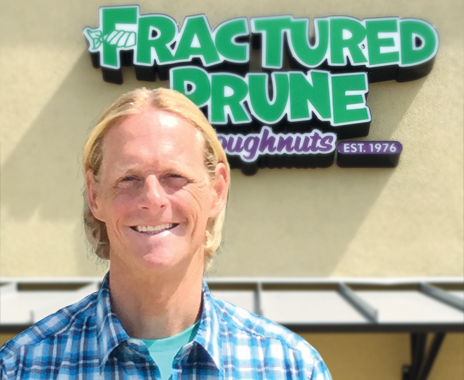Jeff Gottfurcht summited Mount Everest on May 14, 2011, at 6:10 A.M. As if being part of the elite group of humans who have conquered Everest wasn’t enough, Gottfurcht also made the climb with a preexisting rheumatoid arthritis condition and remains the only person in the recorded history of Everest to climb the mountain with that diagnosis.
Formerly an investment stockbroker for UBS Financial Services for more than 10 years, Gottfurcht—an avid runner and hiker—wanted to take his business experience and turn it into his own entrepreneurial career. After the Everest climb, he parlayed his experience into a franchise deal for 21 Fractured Prune Doughnut locations in the heart of Silicon Valley.
Gottfurcht explains how franchisees can use endurance, preparation, and dedication to climb to the top of the franchise world.
1. Your challenge is your advantage
Everyone has a Mount Everest in his or her life. I just chose to climb the real mountain. Franchisees in this business have to stay absolutely focused on their goal; there can be no deviation. They will learn from every challenge they face, and they will face it—whether from government agencies, customers, or employees. Every single day brings challenges, but those challenges are just passing moments. Deal with them, get them fixed, and move on.
In the fast-paced financial industry, change is not a new concept. People can sometimes become a prisoner of a concept, so when a change occurs, they’re handcuffed to their idea. In this industry, we will not be prisoner to concept; we will change with change. That’s how you succeed.
We were so happy to be introduced to the wonderful Fractured Prune concept. The success of these stores is much like the combination of a safe: One turn of the knob doesn’t equate success. With every up and down you face with your stores, success will still be there as long as you continue to expose customers to your wonderful brand and as long as you keep on climbing.
2. Rely on training and preparation
When looking at companies, I was truly lucky to have a close adviser in my wife’s grandfather, who is the former president of Ford Motor Company and the former dean of Stanford Graduate School of Business, Arjay Miller. He told me, “Just like when buying a stock, if you’re going into new business, don’t get into anything you don’t understand perfectly.” I know doughnuts, and I love doughnuts. I also looked to the quick-service industry and its growth potential. Fractured Prune is a great concept, and we felt strongly about the product. I was able to speak to owners of different franchises across the country, as well as other people in the food industry. The one thought they all shared about us bringing Fractured Prune into the Silicon Valley was location, location, location. This advice allowed us to identify what areas we wanted to be in and what other fast-casual enterprises we wanted to be next to.
Being in the backyard of companies like Google, Apple, and Facebook, we knew there was a diverse, dense population along the San Francisco Peninsula. The location, in combination with our wonderfully unique, customizable product, could do very well in a creative community. We signed on to own 21 stores. In our research, we uncovered that in order to be successful, you want to be where the people are.
3. Expect the unexpected
It’s serious business on Everest, and I unfortunately saw many people who were not mentally equipped for the challenge turn around. It’s one thing to be physically trained, but your mentality has to be strong as well. Being able to cope with the climb for two months takes some skill. The experience is extremely difficult. Mountains endure; not so much people.
When facing a huge challenge like climbing Everest, there are serious risks involved, so one has to be able to manage that fear and that risk. I learned that the good times might not always last—you have to be prepared. Unexpected things occur, but you have to adapt. If a new health code law comes in, adapt. If there’s an issue with an employee, adapt. You have to be open-minded and change with change. I learned that persistence is key. You have to learn how to push through and work through any obstacle in order to reach your goals.
4. Rely on management, trust in family
Being away from your family is an excruciating part of the climb, but I had the full support of my wife in attaining my goals. We both know that a life without goals is meaningless.
Our first two stores in Santa Clara and San Jose are now open, but others are located in new retail centers, which are still being built. Realistically, it will take three years to attain all of the locations. My wife and I are overseeing the entire operation, but I learned very early in business that the key to success is having great managers and a wonderful support team. We have a superb management team, and it’s been amazing to bounce ideas off of my network of family and friends. We are able to collate our years of experience to help mold this.
Finally, perhaps the most important lesson I learned from climbing Everest and starting my career is that family is everything. Success is wonderful, but it is absolutely nothing compared to your family.








